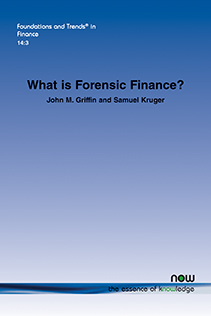What is Forensic Finance?
By John M. Griffin, McCombs School of Business, University of Texas at Austin, USA, john.griffin@utexas.edu | Samuel Kruger, McCombs School of Business, University of Texas at Austin, USA, sam.kruger@mccombs.utexas.edu
Abstract
We survey a growing field studying aspects of finance that are potentially illegal, illicit, or immoral. Some of the literature is investigative in nature to uncover malfeasance that is recent and possibly ongoing. Other forensic finance research examines past events to generate a fuller understanding of the activities, economic magnitudes, incentives, and players involved. The work spans newer areas such as cryptocurrencies, financial advisor and broker misconduct, and greenwashing; and newer research in established fields that are still developing, such as insider trading, structured finance, market manipulation, political connections, public finance, and corporate fraud. We highlight investigative forensic finance, common economic questions, common empirical methods, industry and political opposition, censoring, and the importance of avoiding publication biases. Compared to other finance papers, forensic work has similar citations and SSRN downloads, and more media and Securities and Exchange Commission (SEC) citations. Along with prominent examples of industry reform and awareness, this highlights the potential for real-world impact. By laying out commonalities in research themes, questions, methods, and approaches across fields that may at first seem disparate, we hope to encourage more investigation of incentives and mechanisms in darker corners of finance.
What is Forensic Finance?
What is Forensic Finance? surveys a growing field studying aspects of finance that are potentially illegal, illicit, or immoral. The monograph is structured in three main parts. First, the authors identify forensic papers published in top finance journals to broadly describe the field and its potential impact. Second, common themes and suggestions for impactful work are summarized. Third, the authors review important recent forensic research, organized by four main topic areas: financial reporting misconduct, financial market misconduct, financial advisor misconduct, and public finance misconduct. Financial reporting misconduct includes misreporting by corporations and investment firms, misreporting and related issues in structured finance (e.g., residential and commercial mortgage-backed securities), and misreporting of environmental, social, and governance measures, often referred to as greenwashing. Within financial market misconduct, the monograph reviews cryptocurrencies, market manipulation, and insider trading. Financial advisor misconduct consists of fraud and other forms of misconduct by brokers and other financial advisors. Within public finance misconduct, the monograph examines public corruption, tax evasion, and government program fraud. The monograph concludes with suggestions for future research and thoughts on how to shape the future of forensic finance.

Online Appendix | 0500000073_app.pdf
This is the article’s accompanying appendix.